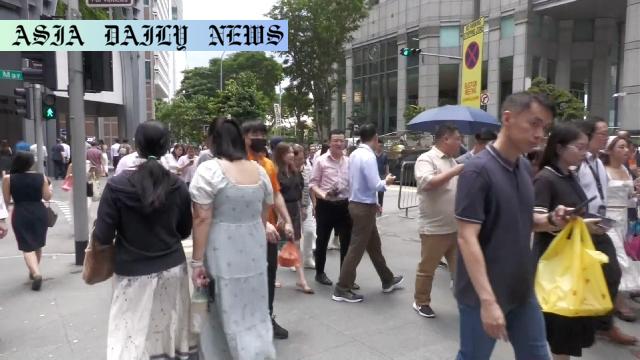Election: Singapore to vote in general election on Saturday against backdrop of high costs and housing concerns.
- Key Point 1: Singapore to hold its general election on Saturday after five years.
- Key Point 2: High living costs, rising housing prices are primary concerns for voters.
- Key Point 3: Ruling PAP aims to address economic strains with relief measures.
- Key Point 4: Workers’ Party suggests removing consumption tax on necessities.

Singapore’s Upcoming General Election
Singaporeans are gearing up to cast their votes in the upcoming general election this Saturday, marking the nation’s first such event in five years. A total of 97 parliamentary seats are at stake, with the ruling People’s Action Party (PAP) looking to secure a stronger mandate in the face of ongoing economic challenges and a gradually evolving political landscape.
Amid Rising Costs, Economic Relief Takes Center Stage
One of the most pressing topics in this election cycle is the impact of global inflation on everyday essentials in Singapore. As the country relies heavily on imports, rising prices for daily necessities and housing have become chief concerns for its citizens. Since the COVID-19 pandemic, coupled with broader global crises like Russia’s invasion of Ukraine and strained international trade relations, costs for workers and industries have only climbed higher.
Public sentiments reflect these struggles, with an average 20% increase noted for iconic local dishes such as chicken rice, indicative of price hikes across food sectors. Public housing costs meanwhile, have also surged, making affordability a serious concern for voters in both new and resale markets. Citizens, especially from low-income groups, are finding it harder to keep up with rising expenses, compelling them to urge the government to prioritize sustainable affordability solutions.
Ruling PAP and Its Strategic Response
The People’s Action Party, a long-standing political force in Singapore since the nation’s independence in 1965, has spearheaded campaigns focusing on stabilizing the economy over the years. With Prime Minister Lawrence Wong’s leadership succeeding Lee Hsien Loong in 2022, the administration enters this election highlighting solutions such as financial support through cash vouchers worth up to 800 Singapore dollars (610 US dollars) as measures to uphold household welfare in tough economic times.
The PAP showcases their achievements in pushing for decades of economic growth despite challenges such as tariff pressures from policies under former U.S. President Trump, and trade frictions between global superpowers. However, questions remain about whether these measures are enough to address deep-rooted domestic economic issues that directly impact citizens’ lives.
Opposition’s Take on Economic Reform
On the other side of the political spectrum, Singapore’s Workers’ Party is emphasizing equitable solutions targeted at easing the financial burden on average Singaporeans. One of their most prominent proposals includes exempting essential goods such as food from consumption tax. This policy has gained traction among middle- and lower-income groups, who feel the weight of inflation on basic daily needs most profoundly.
Additionally, discontent with the rising costs of housing and inadequate wage growth has driven people to explore alternative voices within the political sphere. The Workers’ Party projects a vision of a more inclusive economy where necessary adjustments to the tax system could distribute the financial strain more equitably across socio-economic classes.
A Shifting Political Ground
Singapore’s political stage remains varied but cohesive even amidst challenges. Voter dissatisfaction in the previous election pushed the PAP’s vote share to its third-lowest ever at just over 61%, showcasing rising demand among citizens for greater accountability and innovation in policymaking. Prime Minister Wong and others in his administration will now need to engage with citizens beyond economic indicators, ensuring their policies resonate directly with everyday realities.
The outcomes of Saturday’s vote will reflect both the people’s approval of the ruling government’s efforts and the growing appetite for diverse political representation. Regardless of the results, the electorate’s priorities—chiefly affordability and economic stability—will likely steer future policymaking for Singapore in the long term.



Commentary
The Broader Implications of Singapore’s General Election
As Singapore approaches this pivotal general election, the issues at stake transcend just numbers or statistics. At the heart of this moment lies the collective sentiment of everyday citizens navigating a rapidly shifting economic terrain. From climbing housing costs to inflation eating away at incomes, their grievances paint a clear picture of what they need from their government—tangible and proactive measures to uphold their standard of living.
The Dynamic Between Stability and Change
The ruling PAP’s historical role as an anchor of stability since Singapore’s independence is both an advantage and a challenge. While their track record speaks for itself, voters today are demanding new solutions to old problems. The PAP’s ability to present itself as not just the custodian of past success, but as an adaptive, forward-looking body will determine how much trust it continues to inspire in its citizens.
Balancing Everyday Needs with Global Challenges
For both the PAP and opposition parties, addressing global inflation and ensuring local affordability will be a delicate balancing act. It’s not just a matter of policy promises—it comes down to execution, empathy, and effective cost management. Citizens will be watching closely to see which party truly listens and innovates to alleviate hardships without sacrificing long-term fiscal health.
Ultimately, Singapore’s 2023 election marks a critical juncture where economics, governance, and societal priorities come into sharp focus. For citizens, this day at the ballots represents their voice and their hope for a more equitable and sustainable future.